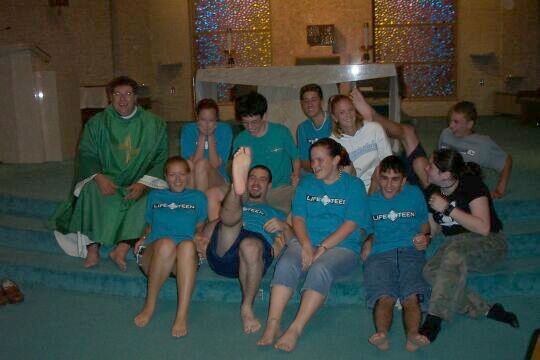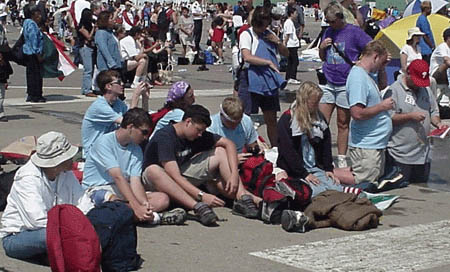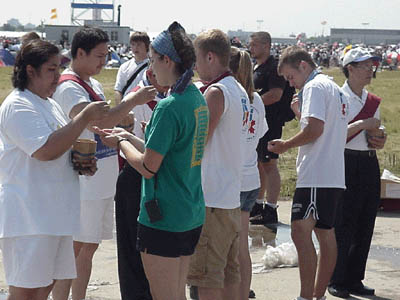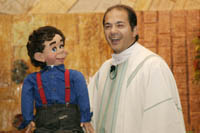




Posted on 07/09/2004 10:05:34 AM PDT by maryz
When I'm teaching Sunday school, I'm encouraged by what I hear from the teenagers at my evangelical Christian church in suburban Detroit. They seem to understand--and, more important, to believe--the bedrock tenets that will help them hew to orthodoxy throughout their lives and make them salt and light in the world.
But the hard numbers say otherwise. It turns out that, while they may profess the faith and indeed love Jesus, the vast majority of Christian teenagers in this country actually hold beliefs fundamentally antithetical to the creed. The forces of moral relativism and "tolerance" have gotten to them in a big way. In fact, some leaders believe that mushy doctrine among the younger generation ranks as the No. 1 crisis facing American Christendom today.
About one-third of American teenagers claim they're "born again" believers, according to data gathered over the past few years by Barna Research Group, the gold standard in data about the U.S. Protestant church, and 88% of teens say they are Christians. About 60% believe that "the Bible is totally accurate in all of its teachings." And 56% feel that their religious faith is very important in their life.
Yet, Barna says, slightly more than half of all U.S. teens also believe that Jesus committed sins while he was on earth. About 60% agree that enough good works will earn them a place in heaven, in part reflecting a Catholic view, but also flouting Protestantism's central theme of salvation only by grace. About two-thirds say that Satan is just a symbol of evil, not really a living being. Only 6% of all teens believe that there are moral absolutes--and, most troubling to evangelical leaders, only 9% of self-described born-again teens believe that moral truth is absolute.
(Excerpt) Read more at opinionjournal.com ...
I don't have a Protestant (or Orthodox) ping list -- if anyone can make up that deficiency, I'd appreciate it!
Ok, here's something anyone who's concerned about this can try: get involved with your church's Sunday School program. Specifically, see if you can get some curriculm that's worthwhile. I remember studying the same twenty Bible stories and 30 virtues/traits/fruits of the Spirit every year until I gave up and started attending the adult Sunday School.
One year, though, we had a teacher who taught C.S. Lewis's "Mere Christianity" and another apologetic book. Now that was interesting, and informative!
I question whether teenagers understand the concept of "moral absolutes."
Frankly, the data for teenagers is far more encouraging than the data for adults. They're more likely to be Christian, more likely to believe in the inerrancy of the bible, more likely to believe in the existence of Hell, more likely to believe that sex outside of marriage is always wrong, more likely to believe divorce is a sin, and more likely to oppose abortion. (They also are more likely to condone gay marriage, but I think that comes from a lack of understanding of what a marriage is.)
Or what is supposed as the Catholic view?
. 2008 The merit of man before God in the Christian life arises from the fact that God has freely chosen to associate man with the work of his grace. The fatherly action of God is first on his own initiative, and then follows man's free acting through his collaboration, so that the merit of good works is to be attributed in the first place to the grace of God, then to the faithful. Man's merit, moreover, itself is due to God, for his good actions proceed in Christ, from the predispositions and assistance given by the Holy Spirit.
Protestantism's founding doctrines were "the Bible alone" and salvation by "faith alone," neither of which is biblical. The Catholic Church has always taught that salvation is by grace.
This is a pretty positive article about today's youth.
How to find the hidden cloud in any silver lining: Post good news in the FR Religion Forum.
Re: "About 60% agree that enough good works will earn them a place in heaven, in part reflecting a Catholic view, but also flouting Protestantism's central theme of salvation only by grace."
This is dead wrong. The Catholic Church does not teach this. As a recent convert I can tell you the Catholic teaches grace is necessary for salvation but all Catholics are called to do good works. They are not saved by them.
Protestants have a distorted view of what the Catholic Church teaches. Sad to say I run into the same thing with Catholics about Protestants.
"About 60% agree that enough good works will earn them a place in heaven, in part reflecting a Catholic view"
_________________________________
Luther confused the works of the Law (of the Old Testament, i.e. circumcision, kosher nutrition, etc.) with the works of Christian charity, and, hence the confusion continues through the ages.
Luther said, don't even attempt to behave, because you can't.
Jesus Christ, St. Paul and the Apostles along with the Catholic Church all say, you can and DO IT! (I was hungry, I was in prison...) Good works are necessary!
According to the Council of Trent, "Good works and merit proceed wholly from the grace of God through the work of Jesus Christ on our behalf (not from ourselves). They are necessary but they do not earn salvation, which is by grace alone: Decree on Justification: chapter 16; Canons 18, 19, 20, 24, 26, 32, 33."





The article is about the views of young people in evangelical Christian church in Detroit.
Your pictures resemble Catholic youth. So what is the relevance?
The relevance is that there is no longer any difference between the majority of the Catholic youth and evangelical Christians.
On an upbeat note,
www.gravityteen.com
It is sponsored by a Roman Catholic group, Vitae Caring Foundation. The GravityTeen boilerplate is:
GravityTeen.com is a place to get inspired, build self esteem, up your personal power and just feel better about yourself. Get teen advice about peer pressure, drugs, and other hard teen challenges and decisions by checking out real life teen stories! And tell your story to help teens, too! There's also a special section in case you or someone you know is pregnant and trying to decide if abortion, adoption or teen parenthood is the answer. It has some very cool prenatal pics and fetal development info to download for school, too! From serious stuff to fun comebacks, gravityteen will have you landing on your feet!
Ninety-one percent of born-again teenagers surveyed a few years ago proclaimed that there is no such thing as absolute truth, says the Rev. Josh McDowell, a Dallas-based evangelist and author. More alarmingly, that number had risen quickly and steadily from just 52% of committed Christian kids in 1992 who denied the existence of absolute truth. A slight majority of professing Christian kids, Mr. McDowell says, also now say that the bodily resurrection of Jesus Christ never occurred.
"There's a greater disconnect now than ever in the history of the church in America between what a Christian young person says they are and what they actually believe," says Mr. McDowell, who has ministered mainly to youth for more than 30 years. "Christianity is based on truth; Jesus said, 'I am the truth.' But you have an overwhelming majority even of Christian kids saying there is no absolute truth."
Catholics have noticed the trend as well.
I found it most interesting this last year when I started to challenge kids in a Catholic Confirmation class about why they believe what they believe (or think they believe). If no one ever asks them what they think and doesn't challenge their errors, they will just drift off into the ozone.
To me, it was important to know where they were starting from before we ever tried to examine what the Church proposed for their belief.
Good points. I've illustrated in the following manner to Protestant friends:
Faith is like the engine of a car. Salvation is impossible without faith just as starting a car is impossible without the engine.
"Good works" is the gasoline that fuels the "engine". Without good works, the engine (faith) is useless and becomes decrepit over time.
Thus, the Church teaches that faith, in and of itself, is what saves, however, without good works, faith can be diminished or lost to the point of endangering salvation of the soul. The Church does not teach that a form of conscious "acceptance" of Christ's salvific acts guarantees a ticket to heaven. Every man, woman, and child has the ability to outright reject the mercy of Christ up until their last breath on Earth. To assume one is "saved" by virtue of making a "decision" is a great occasion of sin.
By doing good works, faith increases, and thus increases the likelihood of salvation at the end of the "race".
Remember what St. Paul said: "I am working out my salvation in fear and trembling." Doesn't sound like he subscribed to the idea that being "born again" was a guarantee of anything....
I agree - C.S. Lewis is great!
The author is describing what he says is a common teen belief; he himself notes a Catholic connection. (Though I do recall that in Everyman, the medieval morality play, Good Works was the only character that agreed to accompany Everyman into the grave, after Good Fellowship, Family, Wealth, etc. ran the other way!)
Nearly 60% of evangelical Christian teenagers now say that all religious faiths teach equally valid truths, according to Mr. McDowell. It's bad enough that they seem to have been co-opted by relativism from within our culture and even from within the church and family. But it's even more disconcerting to realize that we're relying on this generation for the future defense of Judeo-Christian civilization against the highly motivated forces of militant Islam.
Phooey.
They are kids... 40% of Christian teenss evidently think like you do. That's a lot. and the other 60% are still struggling with how there could be only one right way and a majority of the world's population must be wrong. That's a tough one for even me.
We shouldn't be looking to teenagers to have completed and cemented faith that many who have studied for years don't yet claim to be so sure on. They're kids fercryinoutloud. We now want them to be arrogantly sure of everything?
Disclaimer: Opinions posted on Free Republic are those of the individual posters and do not necessarily represent the opinion of Free Republic or its management. All materials posted herein are protected by copyright law and the exemption for fair use of copyrighted works.